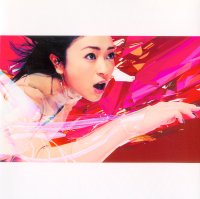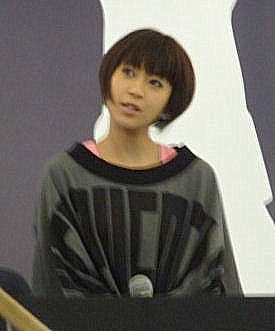
Hikaru Utada, also known by the mononym Utada, is a Japanese singer, songwriter and producer. Utada is one of the most influential and best-selling musical artists in Japan.

First Love is the debut Japanese-language studio album by Japanese-American recording artist Hikaru Utada, released on March 10, 1999, by Toshiba-EMI.

Distance is the third studio album by Japanese singer Hikaru Utada. Toshiba EMI released it on March 28, 2001, making it her second release with the label. Utada wrote and co-produced the majority of the album, alongside previous collaborators Akira Miyake and her father Teruzane Utada, as well as new collaborations with American producers Rodney Jerkins and Jimmy Jam & Terry Lewis. Distance, like its predecessor First Love (1999), is influenced by pop music and R&B, with additional hip-hop, rock music, reggae, and techno influences from Western music.

Exodus is the second English-language album by Japanese-American singer-songwriter Hikaru Utada, released on September 8, 2004 by Island Records under the moniker Utada. Her first English-language album called Precious was released under the name "Cubic U". After being discovered in North America by Island CEO Lyon Cohen when she contributed to the Rush Hour 2 soundtrack, he was very interested in signing Utada to his record label and she eventually accepted the offer. She traveled to Los Angeles to sign the contract and began recording the studio album straight after her signing. However, during the time frame from 2002 to 2003, Utada was diagnosed with a benign ovarian tumour that needed surgery and treatment. She also married her then-husband Kazuaki Kiriya, which stopped recording temporarily.

"Be My Last" is Hikaru Utada's 14th Japanese single, released on September 28, 2005. It was used for the 2005 film Spring Snow, an adaptation of the 1966 Yukio Mishima novel of the same name.

"Hikari" is a song recorded by Japanese–American recording artist Hikaru Utada for her fourth studio and third Japanese language album, Deep River (2002). It premiered on March 20, 2002, as the third single from the album in Japan. It was written and composed by Utada, whilst production and arrangement was handled by Utada, her father Teruzane Utada, and long-time collaborator Miyake Akira. The single, and a remix by Russell McNamara, was used as the official Japanese theme song for the 2002 action role-playing video game Kingdom Hearts, and appeared on its original soundtrack respectively. Musically, "Hikari" is a pop folk song. Lyrically, it is about mysteries in life and human activities.

"Traveling" is a song recorded by Japanese–American recording artist Hikaru Utada. It was released as the second single from her fourth studio and third Japanese language album, Deep River (2002). The track was written and composed by Utada, whilst production was handled by Utada, her father Teruzane Utada, and long-time collaborator Akira Miyake. Musically, "Traveling" is a dance-pop song, influenced by house music. Lyrically, it discusses human activities and dreams.

"Addicted to You" is a song by Japanese-American recording artist Hikaru Utada from her second studio album Distance (2001). It was released as the album's lead single on November 10, 1999 by EMI Music Japan. "Addicted to You" was written by Utada and produced by Jimmy Jam & Terry Lewis; this is Utada's first collaboration with American producers and composers. The single artwork was shot by American photographer Richard Avedon and features two black-and-white figures of Utada. Musically, "Addicted to You" is an R&B song.

"First Love" is a song by the Japanese-American singer-songwriter Hikaru Utada. It was released on April 28, 1999, as the third Japanese language single from her second studio album, First Love, which was issued a month previously. It was certified double platinum for 800,000 copies shipped to stores in Japan.

"Keep Tryin'" is a song recorded by Japanese American recording artist Hikaru Utada for her sixth studio and fourth Japanese album, Ultra Blue (2006). It premiered on February 22, 2006 as the fifth single from the album in Japan. It was written and composed by Utada, whilst production was handled by Utada, her father Teruzane Utada, and Miyake Akira. It included the B-side track "Wings", which also appeared on the parent album. Musically, "Keep Tryin'" is a pop song with lyrics that contain self-empowerment themes. Upon its release, the track received generally mixed reviews from music critics.

The discography of Japanese-American R&B and pop singer Hikaru Utada consists of eleven studio albums, four compilation albums, eleven video albums and numerous singles and promotional singles. Utada began as a musician in the early 1990s as a member of U3, a family unit made up of her, her mother Junko Utada, also known as 1970s enka singer Keiko Fuji, and her father, musical producer Teruzane Utada. U3 released their debut album Star in 1993, with the hope to debut in America. In 1996, the group was rebranded as Cubic U, an R&B project focusing on Hikaru Utada, resulting in the English language album Precious in 1998 with record label Toshiba EMI.

"Flavor of Life" is Hikaru Utada's 18th Japanese single. The physical single was officially released on February 28, 2007.

"Kiss & Cry" is a song recorded by Japanese American recording artist Hikaru Utada for their seventh studio and fifth Japanese album, Heart Station (2007). It was written, composed, and arranged by Utada, whilst production was handled by Utada, their father Teruzane Utada, and Akira Miyake. The single premiered on May 31, 2007 as the third single from the album in Japan. It was re-released as a double A-side single with "Beautiful World", which also appeared on the parent album on August 29 in Japan, and digitally worldwide. Musically, "Kiss & Cry" is an R&B song, influenced by pop and hip-hop music. Lyrically, it discusses both Utada's upbringing and social beliefs between both Western and oriental regions.

"Colors" is Hikaru Utada's 12th Japanese-language single, and is the only single they released in 2003. It was released on January 29, 2003, and debuted at number one on the Oricon charts with 437,903 copies sold in the first week, and became their fifth single to achieve two consecutive weeks at the number one slot, a comparatively rare feat. Two versions were released, CD and DVD.

"Automatic" is a song recorded by Japanese–American singer Hikaru Utada, taken as the lead single from her debut album First Love (1999). It was released on December 9, 1998, through Toshiba-EMI in three physical formats: mini CD single, standard-size CD single and 12" vinyl. Additionally, the single included the A-side "Time Will Tell", which originally served as the B-side for these versions. The song was written and co-produced by Utada, while Akira Miyake and the singer's father Teruzane Utada served as producers. Despite working recording in English under the name Cubic U, "Automatic" is Utada's first Japanese recording, and was released after she enrolled into high school in Japan.

Girl's Talk is the first Japanese studio album by South Korean girl group Kara. It was released on November 24, 2010, in four editions: CD+DVD, CD+Photobook (28-pages), CD-Only First Press coming with Korean versions of the songs "Sweet Days", "Love Is", and "Binks" and a CD-Only Normal Press coming with no bonus tracks. The album peaked at number two on the Oricon Weekly Album Charts and was certified as double platinum by the RIAJ.
"Music is My Thing" is the 14th single by the Japanese band Dream, and the first single by the band with eight members. The title track was used as the fifth ending theme to the anime Hikaru no Go. The song is a Japanese-language remake of a song originally recorded in English by Belgian artist Samantha Gilles in 1986. The promotional video was released on the Dream Party DVD and its "making of" was released on the dream world limited edition CD+DVD. The single reached number 18 on the weekly Oricon charts and charted for four weeks.

"Time Will Tell" is a song recorded by Japanese–American singer Hikaru Utada, taken as the lead single from her debut album First Love (1999). It was released on December 9, 1998, through Toshiba-EMI in three physical formats: mini CD single, standard CD single and 12" vinyl. Additionally, the single was originally served as a B-side to "Automatic", but was changed into an A-side. The song was written and co-produced by Utada herself, while Akira Miyake and the singer's father Teruzane Utada served as producers. Despite working recording in English under the name Cubic U, "Time Will Tell" is Utada's first Japanese recording, and was released after she enrolled into high school in Japan.

Fantôme is the sixth Japanese studio album by Japanese-American singer-songwriter Hikaru Utada. Although Utada announced an indefinite hiatus from the public eye in August 2010, she continued writing and composing material with her father, Utada Teruzane, and long-term collaborator, Miyake Akira. Musically, Fantôme contains a collection of tracks that utilizes acoustic and stripped-down instrumentations, alongside influences of pop, electronic, and R&B music. The lyrical content delves into themes of grief, sadness, love, and death—mostly influenced by the death of her mother, her second marriage, and the birth of her son in 2015.

One Last Kiss is an extended play by Japanese musician Hikaru Utada, which was released in the US on March 9, 2021. It was released for promotion of the Japanese animated film Evangelion: 3.0+1.0 Thrice Upon a Time around the time of the film's release. It contains all the previously released theme songs that were made for the Rebuild of Evangelion film series. It also contains the theme song "One Last Kiss", which was co-produced by A. G. Cook and released in conjunction with the film on March 10, 2021.

















